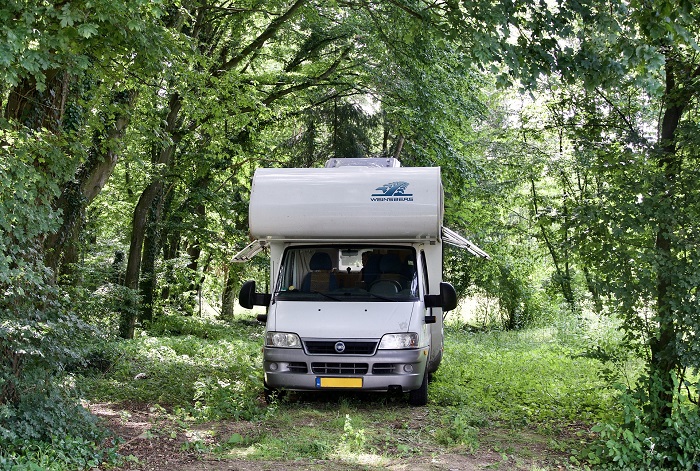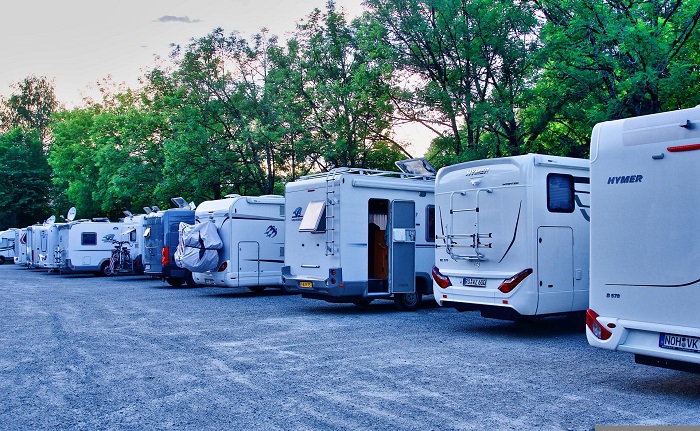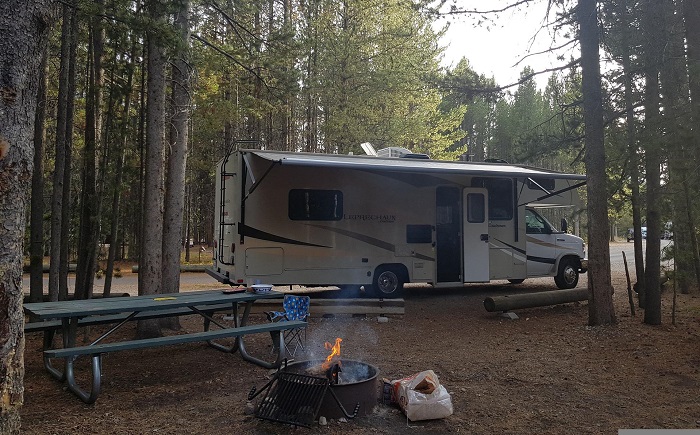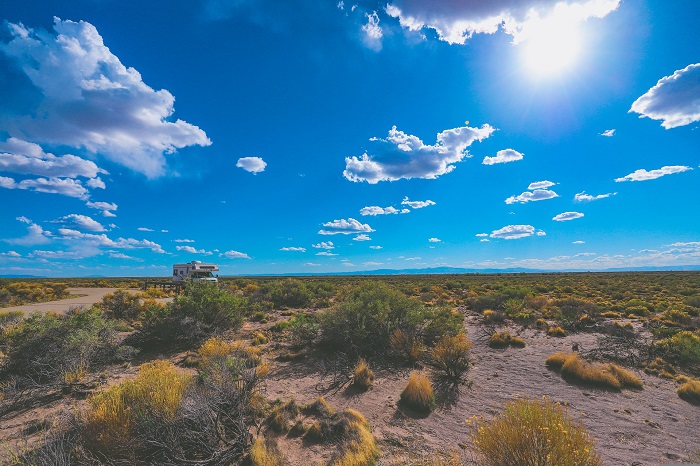What is dry camping? Adventurers who wish to explore the wild to the fullest have all flocked to dry campings in recent years. With no water or electricity available, they will receive hands-on lessons regarding survival skills while still immersing in lots of fun. What a great way to spend your hard-earned holidays!
Nevertheless, such trips are still unfamiliar to many conventional campers, which is why we enter the scene to offer you some needed help. So, what is it and how to ensure your enjoyment can reach maximum height? This article will cover it all. Keep scrolling!
What Is Dry Camping?
It involves off-ground campings with no water or electricity. Granted that you have permission from the site's owner and are well-prepared, such a trip is safe and 100% legal.
1. Overview
Dry campings involves several-day bunking in RVs, motorhomes, or vans outside traditional campgrounds, without water or electricity. The campers will set up their camps in public or private areas (the latter calls for some permission from their owner) at zero cost. In forests and national parks, such activities have another name, "dispersed campings".
In general, dry campings can be either a necessity (when other campgrounds have been full and you have nowhere else to go) or a deliberate choice.
Boondocking is also a subcategory of dry camping, associated mostly with private lands. People engaged in boondocking set their camps in box stores or supermarket parking lots (Cabela and Walmart are some of the most favored choices).
However, as it gives off much fewer chances to explore natural landscapes and remote regions, boondocking still lags in popularity compared to wild dry-camping.
2. Is It Safe?
Yes, it's perfectly safe if you truly understand your surroundings and current needs.
For a successful trip, one must have enough food, some means to stay cool or warm in extreme weather (too low or high temperature), and extra accessories for better self-care, like heaters and water filters. We will return to this aspect in the latter half of the article.
Accurate awareness of the surroundings is more important than ever if you opt for boondocking (often far from high-traffic and populated areas). For instance, those camping in bear regions must learn all the necessary tips to avoid being attacked or injured. Ask for help and advice from experienced campers to ensure your trip undergoes no trouble!
But ironically, for some reason, research reports a higher accident risk in densely-packed regions rather than natural, wild sites. Is it because humans are still a threat to each other at the end of the day?
Hence, settling in a place with no humans nearby might not be as dangerous as we thought; some RVs claim they feel safer here than staying at the heart of a big city.
3. Is It Legal?
In most cases, yes; no legality issues will occur if whoever owns the land has already granted you his permission. For public spaces, it's a must to ask for consent from the state or national park services.
We believe all of you may know this already, but some reminders do not hurt: first, always remember to abide by the regulations. Secondly, clean up the area once you are done with your trip, leaving no traces or destruction behind!
The Pros and Cons of Dry Camping

Dispersed campings can be fun and thrilling, but by no means are they a one-size-fits-all alternative for everyone. For the best preparation, you need to have an insightful comprehension of all the pros and cons it delivers. Keep scrolling for our verdict:
1. Pros
Now come the advantages of this camping type.
The first palpable competitive edge is its costs (or a lack thereof). Many dry-camping options in public areas do not charge you a single penny, while those in private sites might either be free of charge or only cost a very small fee.
Either way, it is safe to conclude that they never involve expensive renting or campsites compared to most official campgrounds.
Some other pros are:
- No landowners' restrictions
- More choices for parking spots
- Fewer campers (or even none at all)
- Good opportunities to explore nature
2. Cons
What about the drawbacks? In this aspect, the concept of wild-life adventures and living off-grid is the most concerning dilemma here.
No water or electricity nearby means you must prepare water before the trip even starts, taking extra care not to waste water as much as possible. Bringing extra gas is also a must; and in case mishaps happen, you might have to brace yourself for on-fire cooking.
Other cons you need to consider:
- Legal limits (some lands are not open for camping)
- Permit requirements at times
- Calling for careful plans several months (or even years) ahead of the trip
- Restricted amenities
- High work requirements
The latter stems from the fact that you are settling in wild, middle-of-nowhere regions. For instance, mountainous campings will likely expose you to harsher temperatures, which means you have to manually install skirting products in your RVs to keep frozen plumbing at bay.
And that's just barely the start; you also need to get your hand on every task from clothes-washing and campfire maintenance to cooking!
But in return, those extra works are what attract people to dry camping, giving them an authentic and immersive experience nothing else can offer!
3. Main Takeaway
With all these pros and cons listed, it's clear that these activities are not for everyone. While some people hate the hassles of having to prepare so many things, others do not mind their hands getting dirty.
Assess both your preferences and financial capabilities to decide how long the trip should last - or whether you should partake in it in the first place!
Dry Camping Vs Wet Camping

Wet campings require clear boundaries for the campgrounds; you cannot go anywhere beyond these borders. They also charge more fees compared to dry options. But in return, electricity, water, food, and other important supplies are immediately accessible, giving campers more time to relax and enjoy their time.
1. What Makes Them Different From Each Other?
As their names suggest, these two concepts are in clear contrast. Wet camping provides a completely different experience from its dry counterparts due to their setup distinctions.
While dry camping can take place in a wild site with no clear boundaries, wet camps call for a clear establishment of the campgrounds. Hence, picking empty areas or pulling up at a national park is not possible with wet campings.
Some parks do indeed accommodate pre-set campgrounds; however, your trip will be restricted to those regions alone (not anywhere else in the same park like dry campings).
Once the campground has been set up, wet campers will be able to instantly access all the necessary hookups (electricity and water). Meanwhile, dry campers have to prepare these things from the get-go.
2. Which One Is More Preferred Between The Two?
Judging how wet campings have everything you need without much preparation, it is easy to understand why it thrives in better popularity. The reason is simple: wet camping is much more convenient, ensuring all the necessary hookups are 100% available.
Aside from the expenses, there's no need to worry about anything else. With all supplies ready, campers have more time to appreciate their trips and relish in relaxation. Not to mention, established campgrounds enjoy more safety and offer better amenities to the tenants!
True, dry campings have their own appeal and offer a wonderful opportunity to learn and explore nature's beauty; nevertheless, it also arrives with many huge stressors and disadvantages already discussed above.
Dry Camping Essentials

Solar panels and generators will do wonders for your outdoor cooking. Filters and bladders can help with the water supplies, while shower bags and dishwashing basins might save lots of space for you. On another note, Weboosts are strongly recommended for full-time RVers to achieve better internet access.
- Solar Panel: An amazing device to help campers turn on lights, cook, and charge critical camper gadgets. Given that there is enough sunshine, solar panels will work all the time.
- Generator: Most experienced campers often purchase generators to produce the necessary electricity for RV operation. On cloudy days when solar panels refuse to work for your kitchen appliances, good generators can be a wonderful alternative!
- WeBoost: For those opting for RV full-time and working online even during their camping, we strongly recommend WeBoosts to get better internet and cell signals. One note, though: they will not work in areas of no signals - since there isn't anything to boost in the first place!
- Grill/Grill Kit: Never forget the most basic camping necessities - portable grills and grill kits! Trust us; your boondocking sessions will be much easier and more pleasant if outdoor cooking is doable.
- Water Filters: The water supplies provided by your camping site are not always trustworthy, while water bottles made of plastic do not pose so much good to the environment. Hence, we believe a great filter will allow you to utilize natural water without suffering health issues.
- Heater: Some campers like to boondock in winters and early springs when harsher colds can arrive unexpectedly! You might end up bombarded with snow and rain. To prepare for such a catastrophe, do not forget a portable heater.
- Outdoor Lanterns or Lights: Of course, no campground lights or light posts will be available. Worse, some forests also issue fire restrictions for fear of accidents, meaning no campfires are allowed. In that case, outdoor lights can offer lots of support!
- Flashlights: It's better to give every member a flashlight as a part of the camping gear. These devices can lift off lingering anxiety, giving people a better sense of safety whenever they move around the camps!
- Camping Table: Not many owners agree to lend you camping tables, so preparing one in advance is a great move. And even if they do, purchasing an extra table to place your grill doesn't hurt, either!
- Water Bladders: Like the WeBoost, these products are terrific for full-time RVers. Fresh water runs out quite fast, after all; fortunately, with a convenient bladder, you will never have to drive the entire van around town just to fill up your water supply ever again!
- Dishwashing Basin: The greatest tactic for room-saving is to wash your dishes outdoors. A foldable dishwashing basin can come in handy in this regard, and it's usually pretty cheap, too!
- Outdoor Solar Shower Bag: Most RVs often install a preset dry camping bathroom; however, for those that do not, you can always turn to camp shower bags instead. An average bag holds at least five water gallons, warming up under the sunlight in less than three hours!
Dry Camping Tips and Hacks
- Practice with several short trips first: There are some learning curves to disperse campings. It would be best for beginners to practice with short trips first, such as one-night camping at Harvest Host or Walmart parking lots.
Over time, slowly extend those trips to three or four nights while familiarizing yourself with power and water conservation.
Just practice as often as possible, and you will soon find these trips easier and easier!
- Learn to manage your garbage: Garbage might not be the first thing that comes to mind when discussing dispersed campings, but they are important; always remember that we have no access to campground dumpsters like with wet campings!
Hence, dry campers need to think of another way for waste disposal. Some gas stations let customers throw garbage away if they have filled up; similarly, certain grocery stores wouldn't mind you throwing trash bags while shopping. Make sure to ask for permission first, though.
Conclusion
So what is dry camping? Our intensive guidelines have delved into all relevant facets of this burning question, offering you wonderful tips to enjoy and explore nature to your heart's content.
While wet campings seem much more common and appealing due to their available hookups, one or two trips with fellow dry campers can open your eyes to many fun survival skills lessons. That's why we still recommend it for ambitious adventurers out there; just make sure you have all the important gadgets ready before starting!





![[Camping Guide] How To Waterproof A Tent Effectively how to waterproof a tent](https://hikertrack.com/wp-content/uploads/2017/06/how-to-waterproof-a-tent-218x150.jpg)




